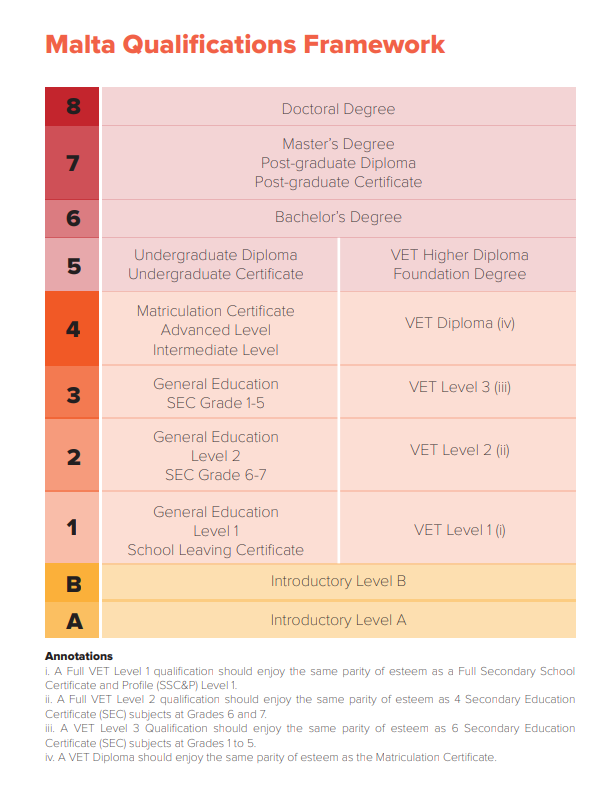Malta is one of the 48 member countries participating in the Bologna Process, which in 1999 embarked on a process to harmonise qualifications in education with an emphasis on Higher Education. The Malta Qualifications Framework for Lifelong Learning (MQF) as first launched in 2007 by the then Malta Qualifications Council (MQC), which was established through Legal Notice 347 of 2005. The MQC has since developed into the Malta Further and Higher Education Authority (MFHEA). It assists institutions and individuals to meet the challenges set by the Further and Higher Education Strategy 2020 and Malta’s National Strategic Action Plan for Further and Higher Education 2030, the draft of which was published for public consultation in December 2022.
The Framework for the Education Strategy for Malta 2014-2024, among others, emphasises that the National Qualifications Framework for Lifelong Learning continues to act as catalyst for quality assurance, accreditation and transparency of all learning experiences. The Malta National Lifelong Learning Strategy 2020 also deals with accreditation issues, so much so that it aims to develop a coherent, equitable and sustainable accreditation system for adult learning.
Malta Qualifications Framework
The MQF is the regulatory framework and a referencing tool that helps to describe and compare both national and foreign qualifications to promote quality, transparency and mobility of qualifications in all types of education (general and vocational; compulsory and further and higher education). The MQF is referenced to the European Qualifications Framework (EQF); the Qualifications Framework of the European Higher Education Area (QF/EHEA); and the Transnational Qualifications Framework of the Small States of the Commonwealth (TQF), in a process that can be used to reference national qualifications to the National Qualifications Frameworks in Europe and beyond.
The MQF is based on 8 levels, as is the EQF, and each level is described in terms of learning outcomes, making it easier to cross-reference with those for the EQF and QF/EHEA. These are listed in the fourth edition of the Referencing Report which also refers to credits, with the understanding that these may be called either ECTS or ECVET in line with European tools. The detailed descriptors in Malta are considered as the basis for ensuring a transparent referencing process.
MQF Levels 1 to 4 covers all education from compulsory school age up to vocational or academic courses leading to the Matriculation Certificate, Diplomas or Higher National Diploma Certificates.
The Higher Education sector in Malta includes all education, training and research that lead to qualifications classified at MQF Levels 5 to 8 and are also linked to the Qualifications Framework in the European Higher Education Area (QF/EHEA).
The MQF levels are defined in the table below:

Regulation of education provision vis-à-vis the MQF
The Malta Further and Higher Education Authority (MFHEA) aims to promote and develop further and higher education in Malta through regulation and the promotion of best practices. All the functions of the MFHEA can be found in Article 2.6. With regards to the MQF, the MFHEA is also responsible for maintaining the MQF and is the European Communications Qualifications Framework (EQF) National Coordination Point for Malta. MFHEA promotes and maintains the MQF by:
- establishing the policies and criteria on which the Framework is based;
- validating informal and non-formal learning and recognizing it at an MQF level;
- accrediting qualifications and awards developed and delivered in Malta, thus ensuring that programmes are delivered in learning outcomes, in accordance to established MQF level descriptors; and
- hosting the Maltese ENIC-NARIC centre: the Qualifications and Recognition Information Centre (QRIC), which is responsible for providing the referencing and equivalence of foreign qualifications.
Validation of informal and non-formal learning vis-à-vis the MQF
MFHEA is also responsible for validation of non-formal and informal learning (VNFIL). VNFIL is carried out through a ‘Learning Outcomes Approach’, which assesses knowledge, skills and competences outlined in National Occupational Standards (NOS) that are pegged to the MQF. NOS are developed and reviewed by industry-specific Sector Skills Unit (SSU), established by virtue of Subsidiary Legislation 327.432, comprising industry-relevant stakeholders. NOS specify what an individual, in a specific occupation, at a particular MQF level, must know and be able to do, thereby linking qualifications to labour market requirements, serving both employers and employees.
